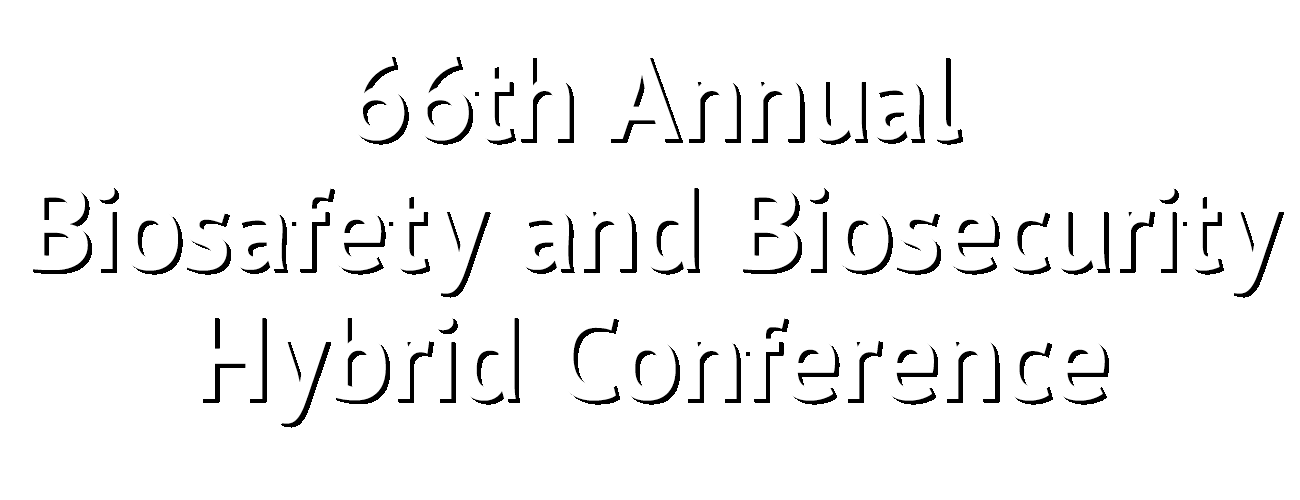Professional Development Courses
All times listed are in CENTRAL TIME ZONE
Friday Courses
Friday, October 13, 2023
CHI Health Center, Omaha, Nebraska
Friday, October 13, 2023, 8:00 AM – 5:00 PM, Room 205
1. BSL-3 Operations and Management
This course will review the important aspects of BSL-3 Operations and Management from two points of view; “hardware” (i.e., facilities & equipment issues) and “software” (i.e., administrative controls). It will cover various aspects you need to consider in order to operate a BSL-3 facility, such as training, maintenance support, occupational health, waste management, maintenance, performance verification, and emergency response. The instructors will encourage interaction and the exchange of experiences among the participants. Regulatory aspects from any specific country, or planning, design, or construction-related issues will not be covered.
Objectives:
- Describe the elements of BSL-3 Operations and Management (risk management, primary barriers, annual performance verification, emergency response, etc)
- Recognize institutional, management, and user responsibilities
- Summarize approaches to developing manuals, SOPs, and training
Suggested Background: Basic Risk Assessment and familiarity with BSL-3 Concepts
Target Audience: Safety Professionals, BSL-3 Managers, Containment Engineers, Lab and Scientific Directors
PDC Level: Basic
COURSE FACULTY
CONTACT HOURS
This course has been approved for 1.0 CM points toward RBP/CBSP recertification. ABSA International is approved as a provider of continuing education programs in the clinical laboratory sciences by the ASCLS P.A.C.E.® Program. This course is approved for 7.5 P.A.C.E.® contact hours.
Friday, October 13, 2023, 8:00 AM – 5:00 PM, Room 207
2. IATA Infectious Substance Shipping Certification
This course is appropriate for those who have some experience with infectious substance handling or shipping but may not have been certified within the past 3 years and those with little to no previous training. The course utilizes several facilitated learning activities. There will be group discussions and interactive exercises focused on the essential areas of infectious substance shipping. New IATA requirements for competency assessment will be administered short interactive assignments, and an online exam. Participants will mark, label, package, and complete documentation for infectious substance shipments (Category A, Category B, and Exempt Patient Specimens), and review applicable regulations with a focus on IATA. Additional US DOT differences will also be addressed. This course is appropriate for those responsible for packaging, marking, and labeling shipments of all categories of infectious substances, dry ice, and liquid nitrogen. Participants have both an online exam (score at least 80%) and practical exercises to complete to demonstrate competency. Successful completion of the course will qualify participants for IATA/DOT certification.
Objectives:
- Review and restate shipping regulations for both air and ground with a particular focus on 49 CFR US DOT and IATA air regulations
- Conduct a risk assessment and be able to properly classify and identify infectious substances for transport purposes
- Package, mark, label, and prepare documentation for shipments of infectious substances to meet regulatory requirements for air and ground shipments
Suggested Background: None
Target Audience: All Safety Professionals, New Biosafety Professionals
PDC Level: Basic
COURSE FACULTY
CONTACT HOURS
This course has been approved for 1.0 CM points toward RBP/CBSP recertification. ABSA International is approved as a provider of continuing education programs in the clinical laboratory sciences by the ASCLS P.A.C.E.® Program. This course is approved for 7.5 P.A.C.E.® contact hours.
Friday, October 13, 2023, 8:00 AM – 5:00 PM, Room 206
3. Animal Research for Biosafety Professionals – An Introduction
Animal Research has contributed to major scientific advances in biomedical, veterinary, and environmental sciences and in public health. However, these efforts often pose significant risks to the health and safety of research and facility staff due to the wide range of species, complex experimental procedures and equipment, and facility hazards that are involved. Balancing optimal worker safety and animal welfare with research objectives yields the best results but requires a solid understanding of how animal programs are managed and an ability to identify and mitigate inherent risks. This course provides a thorough introduction to routine hazards commonly encountered in animal programs that utilize rodents, small animals, nonhuman primates, aquatics, and agricultural species, with a primary focus on identifying and managing biological, chemical, radiological, and physical hazards. The instructors are experienced laboratory animal veterinarians who are actively involved in the management, oversight, and evaluation of animal care and use programs. Topics include assessment and management of animal program hazards; regulations, guidelines, and quality standards that primarily apply to animal research in the U.S.; duties and responsibilities of key program personnel; local oversight systems; best practices that enhance the quality of animal care; and strategies for biosafety professionals to develop and maintain effective partnerships with program staff and institutional animal care and use committee members. Opportunities will be provided to apply new knowledge and skills through group interactive activities and problem-solving sessions.
Objectives:
- Review basic hazard identification and risk assessment techniques relevant to research involving live animals
- Develop an understanding of governing regulations and guidelines that pertain to the care and use of research animals
- Recognize the difference between “regulatory requirements” and “best practices” related to performance-based standards
- Identify successful strategies for working effectively with animal program personnel on common research safety issues
Suggested Background: None
Target Audience: New Biosafety Professionals, All Safety Professionals, Laboratory Workers, New IACUC and Safety Committee Members
PDC Level: Basic
COURSE FACULTY
CONTACT HOURS
This course has been approved for 1.0 CM points toward RBP/CBSP recertification. ABSA International is approved as a provider of continuing education programs in the clinical laboratory sciences by the ASCLS P.A.C.E.® Program. This course is approved for 7.5 P.A.C.E.® contact hours.










